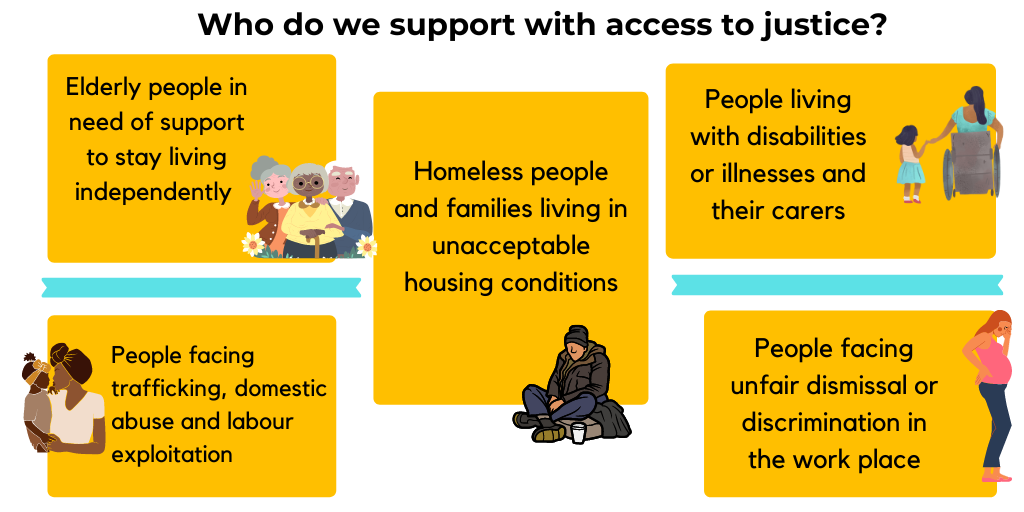Who we help

Why was LLST founded?
London Legal Support Trust was started in 2003 to help with the issue of insufficient funding for those who needed to access legal advice. Since then, with the support of the legal profession, LLST has raised millions of pounds to support legal advice centres in London and the South East to improve access to justice.
Sadly, the amount of funding directed towards legal aid and local authorities has reduced drastically since we were founded. As a result, this has forced agencies to close and in the current climate, the number of free legal advice agencies has dropped considerably.
The issues people face
There is little public funding available for many of the problems which have a significant impact on people’s lives. For instance, claiming the welfare benefits to which they are entitled; employment disputes, concerning a wide range of issues including pay, conditions of work, harassment and bullying; immigration and asylum issues, which force people to live apart from their loved ones; discrimination in accessing goods and services; housing, including homelessness advice and disrepair cases; and community care support to give people the best possible quality of life.
Funding cuts and response
The “LASPO” legal aid cuts in legal aid funding in 2013 removed swathes of funding from social welfare law, while austerity created a greater need. LLST responded by providing key advice agencies with funds to maintain their infrastructure and retain staff in order to provide as much advice as possible. LLST also provided emergency funding to agencies to ensure their doors remained open to people who needed their services desperately.
Crisis intervention
In 2020, COVID-19 and lockdowns created a completely new category of people needing legal help as they fell into debt for the first time in their lives.
Patrick Marples, CEO of South West London Law Centres said: “We are helping a whole new group of people who have never experienced poverty, been unemployed or had to claim benefits but have been suddenly plunged into hardship.”
As well as extra demand for their services, lockdowns also heaped extra costs on the advice agencies. LLST responded by joining with other London funders to provide the funds needed for agencies to refigure their services and to continue to maintain their caseloads.
We are signed up to the London Funders’ “We stand with the sector” response to COVID-19 pledge. Read the full pledge.
Supporting access to justice
The dramatic rise in the cost of living is not the first crisis we have responded to and it certainly isn’t the last. We exist to support advice agencies through every crisis that people face, whether it be personal or widespread.
Just as the COVID and lockdown crises abated, the dramatic rise in the cost of living drove up poverty and created an even greater need for advice services. The advice agencies have been hampered both by underfunding, as their costs have also increased dramatically, and by reducing numbers of social welfare law specialists. This is due to a workforce shortage in recruiting new people into an underfunded sector.
LLST has responded once again to this need by joining with other funders to provide funding for core services and funding for training of new specialists. If you’d like to learn more about this work, read more on the Workforce Development Programme page.
LLST has always been a funder that listens to what our funded partners say and acts accordingly. Therefore, we have signed up to the IVAR “Open and trusting grant making” principles.
FAQs
Community legal advice services are important as they help the most vulnerable individuals and families to be treated fairly. They help over 2 million people every year receive protection, shelter & education. For over 60 years legal and advice services have been helping local people to help themselves.
If someone does not get help early in a problem, it will only become more complex, harder to resolve and more costly. The right advice early on can save £10 for every £1 invested and keep families together in their homes, and in work and education.
Up to two-thirds of the population are unaware of how to get the legal services they need, and nearly 70% have no knowledge of basic legal processes. Less than 50% of young people facing serious problems, for example in housing and education, get the advice they need.
No, we work solely on the fundraising and social policy side of things. Our beneficiaries are the advice agencies we support and if they are in need of legal advice we try to help find this pro bono either through LawWorks (the solicitors pro bono group), Advocate, or by approaching one of the law firms who take part in LLST events.
Many of the advice agencies we support are run on such tight budgets that any “administration”, such as the time and staffing needed for raising money, is not funded, and so unless these agencies have volunteers who are skilled in this area fundraising must either detract from other work or not be carried out. The London Legal Support Trust provides a mechanism through which fundraising can occur. The Trust is entirely self-funding and so does not take away from any funding pools that exist for legal advice providers; any work it does and money it raises benefit only the wider community.
No, we work solely on the fundraising and social policy side of things. Our beneficiaries are the advice agencies we support; we cannot provide any advice or support for individuals seeking help.
If you need advice and support, we would recommend visiting www.advicenow.org.uk

